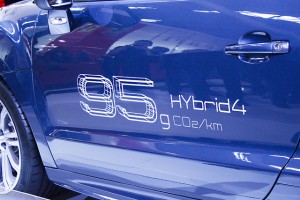Controversial German lobbying tactics delay EU’s car emissions reduction measure
The battle to set emissions limits from new cars for 2020 is becoming increasingly bitter. Lobbying by Germany on behalf of its two leading luxury car makers led to the issue being removed from the agenda of a meeting expected to approve a negotiated settlement – an unprecedented move. Germany’s tactics have caused one senior Commission official to express concern about the integrity of the EU decision-making process, while diplomats have talked about ‘rogue behaviour’ by Berlin creating ‘bad blood’ among ministers.
The EU’s first set of mandatory emissions limits for cars, agreed in 2009 and to be fully enacted by 2015, were always intended as a first step. A second step set 95 grams of CO2 per kilometre as the limit for the average new car by 2020, with the details on how it could be achieved to be finalised now.
After a long and difficult negotiating process, a deal for 2020 was agreed last month by MEPs, Commission officials and representatives of national governments. It involved compromises on proposals to improve testing of new cars’ fuel consumption, and on the availability of ‘supercredits’, a mechanism that allows imaginary sales of ultra-low carbon cars offset the higher emissions from gas guzzlers. T&E welcomed the deal but said it ‘could have been better if member states had focused on the significant long-term benefits of more fuel-efficient cars instead of being influenced by the narrow, short-term interests of some car makers.’
That deal was due to be confirmed by ministers late last month, but at the last minute was removed from the agenda. EU officials confirmed the delay was at Germany’s request, and it is known that Daimler (makers of Mercedes) and BMW are unhappy with the deal. With the Irish presidency ending on 30 June, the file was passed to the Lithuanian presidency. The Lithuanian environment minister failed to mention the issue when setting out his country’s six-month programme of legislation to the European Parliament. Under questioning by MEPs he was, however, forced to admit that ministers would discuss it on 17 July, but it did not appear on that agenda either. The issue was then raised by Italy at the end of meeting provoking eight member states, including France, to demand the item to be reintroduced in early September. BMW is providing 180 cars to Lithuania during its presidency.
Since the start of the month, rumours have been circulating about the tactics used by Germany to force the delay. The European online news agency EurActiv quoted an unnamed source as saying the German chancellor Angela Merkel told the Irish prime minister just before the 27 June EU summit that if Ireland did not support Germany’s wish for a delay, it might lose some bail-out funds.
EurActiv quoted a number of unnamed officials and diplomats speaking very critically of Germany’s approach. One diplomat said: ‘It has mostly been threats and intimidation, and you can’t fight that – people do what you ask out of fear.’ Another EU diplomat was quoted as saying: ‘It’s a really bitter feeling, people are just stunned at the way it is evolving,’ while another said: ‘There is bad blood within the Council about this.’ A Commission source said: ‘There is a strong degree of ill-feeling towards Germany with regard to its antics on the CO2-from-cars file, which have no precedent to my knowledge,’ while another said: ‘It is rogue behaviour for a member state.’ A source close to the Commission secretary-general expressed concern about the integrity of the Council’s decision-making process.
T&E’s clean vehicles manager Greg Archer said: ‘We must not lose sight of the fact that improving fuel-efficiency is a win/win policy with multiple benefits for the finances of consumers, the security of energy supply, the creation of hundreds of thousands of jobs and emission reductions. So for the Commission’s proposals to be watered down at all is senseless. It is almost unprecedented in EU policymaking that the pressure of one country delays a vote in an attempt to overturn a fairly-negotiated agreement. It is ludicrous for Germany to claim it needs more time, as the 95g limit was agreed five yeas ago. The political manoeuvring illustrates how EU decision- and deal-making have become subservient to Germany’s desires, and it’s clear BMW exerts an unhealthy influence.’
Observers were divided about whether Germany’s antics are a desperate attempt to delay a vote until it can secure a blocking minority to water down the 95g target for 2020 even more; or, whether Merkel is just playing for time given the German federal elections in September, and that a deal can be signed after the elections have taken place.
Originally published by Transport & Environment (July 23, 2013) at www.transportenvironment.org/news/%E2%80%98bad-blood%E2%80%99-over-cars-co2
The image is copyrighted by Ricardo Giaviti, and the text and image are subject to the Creative Commons license.



No comments yet, add your own below